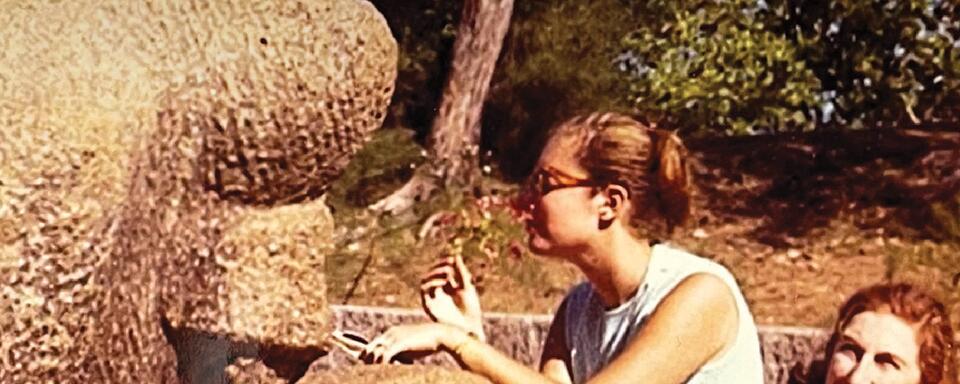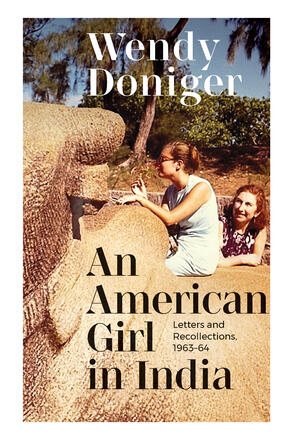
From India with Love, from Wendy, 1963 to 2018
“Dear Mommy and Daddy”
Guest post by Wendy Doniger, on her new memoir, An American Girl in India: Letters and Recollections, 1963–64 (August 2023).
When I first went to India, in 1963, I was twenty-two. As this was my first trip abroad without my parents, I dealt with my terrible homesickness by writing many long letters to them, typed on my little Olivetti, each beginning, “Dear Mommy and Daddy.” Fifty-five years later, in 2018, as I was cleaning out my office at the University of Chicago on the occasion of my retirement, I found the letters in a box that my mother had kept, that had come to me when she died in 1991, and that I had never opened until that day in 2018. Those letters contained the seeds of so many of my later books, places and gods that enchanted me, myths and histories that fascinated me, wonderful people who changed my life. My first impulse was to publish them (as writing books was my primary way of making sense of the world), but I was immediately stopped in my tracks by my realization that they were so naïve (written by a spoilt, pampered Jewish American princess), so riddled with errors (I misunderstood everything about politics and even got a lot of the stories wrong), that they would prove an embarrassment to my friends and rich fodder for my enemies.
I shared the letters, and my misgivings, with my old companion in arms, my Indian publisher, Ravi Singh, who had, in 2010, rescued my book The Hindus: An Alternative History when it came under political fire and [who] had been my publisher ever since. When I proposed to cut out all the parts of the letters that made me blush, all that Orientalism and privilege, he protested vehemently and suggested that, instead, I leave it all in, warts and all, and apologize for my youthful naivete. He suggested that I present the letters as part of a conversation between my 22- and 82-year-old selves. It would be useful to look back upon all the wrong ideas that so many of us shared then, and to view that time in India through the eyes of a scholar who had grown through her own maturing within the parallel self-critique of the academic world in which she lived and worked.
And so I wrote short footnotes to correct the many, many particular errors of fact: incorrect history, warped politics, misunderstood Sanskrit texts, and misquoted English texts cited from memory. And then I wrote longer introductions (to each of the seven sections of the book) to apologize for my more extensive errors of opinion. I began with a prelude reporting on visits to friends in England, letters that set the stage not only for my physical journey but for the colonial British word-view that I was going to shed, gradually, in India. After letters recounting my arrival and first days in India, mostly in Calcutta, there is a section describing the most important aspect of that year, my life in Shantiniketan, the University founded by the Tagore family and peopled by the daughters of the Bengal intelligentsia. That is where I made friends that I cherished for many years and where I began to understand what it meant to live in India. After some months back in Calcutta, I travelled in India with some of my friends from Shantiniketan—to Rajasthan, Delhi, Udaipur, Khajuraho, Madras, Mount Abu, Chittorgarh, and beyond—and finally I returned to Shantiniketan and to Calcutta. There I experienced the World Congress of Orientalists (which prompted me to indulge in a certain amout of gleeful satire on different national types), the assassination of President Kennedy (a time of great sadness and the strange mix of feeling suddenly very foreign to India and at the same time uncannily close to totally unknown Americans gathering at the Embassy), and my sarod lessons from the great Ali Akbar Khan.
I dedicated the book to my students, most of them Americans who were, like me, once young on their first visit to India, and I hope they will enjoy reading it and comparing my experiences with their own. But as I shared earlier incarnations of the book with friends in India, I found that what they enjoyed in it was not my own adventures as much as the picture of India as I saw it then, when India too was young, newly freed from the colonial yoke, and my heart rejoiced at the beauty of the countryside and the majesty of the temples and the extraordinary generosity and kindness of the strangers that I met. Just as people of my generation in the United States now are worried about present developments in the world in general and America in particular, so my friends in India, troubled by India’s present problems and dangers, have been moved to remember how wonderful India was then, especially when viewed through the naïve eyes of a young American girl.
Wendy Doniger is Mircea Eliade Distinguished Service Professor Emerita of the History of Religions at the University of Chicago and has also taught at the School of Oriental and African Studies at the University of London. She is the author of many books, including The Hindus: An Alternative History; Hindu Myths: A Sourcebook; The Ring of Truth: And Other Myths of Sex and Jewelry; and On Hinduism.


